|
|
|
Sort Order |
|
|
|
Items / Page
|
|
|
|
|
|
|
| Srl | Item |
| 1 |
ID:
152390
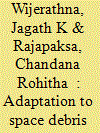

|
|
|
|
|
| Summary/Abstract |
Space exploration is a mechanism whereby, with the use of astronomy and space technology, humans are able to explore outer space and the universe at large. In this article, the authors address space debris issues with a discussion of future space law issues along with a brief elaboration of how the adaptation took place for space debris mitigation guidelines. The history of space law formulated during the United Nations’ General Assembly is justified, along with the resolutions that took place throughout recent years. The authors also elaborate on the importance of theoretical modeling and how it could be adopted into practice utilizing the established debris mitigation guidelines. Legal and political constraints are also highlighted, along with where the future focus on legal factors should be when considering space debris mitigation.
|
|
|
|
|
|
|
|
|
|
|
|
|
|
|
|
| 2 |
ID:
126959
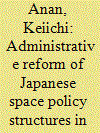

|
|
|
|
|
| Publication |
2013.
|
| Summary/Abstract |
In Japan, there are several government ministries and agencies with important roles in the development and use of space. In 2012, Japan restructured its administrative organs related to the development and use of space through legal amendments to the original acts that established these organs. Although this was an important administrative reform that took four years of planning and discussion to accomplish, this restructuring has not been communicated well outside of Japan. This study provides the first comprehensive overview of the recent legal changes in Japanese space policy. In contrast to some reports, the Ministry of Education, Culture, Sports, Science and Technology (MEXT) still has primary responsibility for the finances and personnel of the Japan Aerospace Exploration Agency (JAXA). This continues to be true even after the Cabinet Office begins its new role as the focal point for formulating Japanese space policy. It remains to be seen how the policy direction of the Cabinet Office will interact with the operational, financial, and personnel responsibilities of MEXT. I argue that knowledge of the roles of MEXT and the Cabinet Office in space policy, and the tension between the two organizations, is key to understanding Japan's future space policy decision-making process. By tracing the history of Japanese space policy since 2001, I also suggest that if bureaucrats had thought more deeply before making major reforms to space policy and its administration, there would have been less confusion over the development of national space policy this past decade. This paper concludes by identifying some key elements to monitor in the coming years of Japan's space policy.
|
|
|
|
|
|
|
|
|
|
|
|
|
|
|
|
| 3 |
ID:
130048
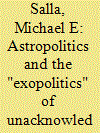

|
|
|
|
|
| Publication |
2014.
|
| Summary/Abstract |
The role of unacknowledged classified programs remains an enigma for fully understanding activities in space and the study of astropolitics. Classified programs by law are not publicly announced, and remain inaccessible to all except those with valid security clearances to be briefed about them. In the United States, waived Unacknowledged Special Access Programs are the most highly classified programs conducted by the military and intelligence community. The same classification protocols are also required of private contractors working with U.S. military departments and intelligence agencies on classified programs. As space continues to grow in its national security significance, the number of these unacknowledged programs pertaining to space is likely to grow significantly from its current number. This requires adopting the necessary conceptual tools and methodological flexibility for investigating unacknowledged activities in space. This also extends to evidence concerning unidentified flying objects and extraterrestrial life. This article suggests that "exopolitics" is a unique multidisciplinary approach to extraterrestrial life that offers a helpful set of conceptual tools for studying unacknowledged space activities, and complements the field of astropolitics.
|
|
|
|
|
|
|
|
|
|
|
|
|
|
|
|
| 4 |
ID:
130045
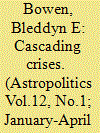

|
|
|
|
|
| Publication |
2014.
|
| Summary/Abstract |
The term space security is often used, but seldom analyzed. This is a significant gap in the literature of space politics, as it posits considerable implications for debates on how to deal with a runaway growth in the space debris population, and how we argue for or against space weaponization. Securitizing all threats in space may lead to greater difficulties in enacting debris removal measures, as these systems are inherently dual-use. A case is made for keeping space security in its traditional connotations of national security so that environmental issues related to orbital debris can be resolved with reduced security concerns in a space development framing.
|
|
|
|
|
|
|
|
|
|
|
|
|
|
|
|
| 5 |
ID:
145497
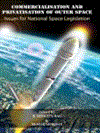

|
|
|
|
|
| Publication |
New Delhi, KW Publishers Pvt Ltd, 2016.
|
| Description |
xxvii, 162p.hbk
|
| Standard Number |
9789383649860
|
|
|
|
|
|
|
|
|
|
|
|
Copies: C:1/I:0,R:0,Q:0
Circulation
| Accession# | Call# | Current Location | Status | Policy | Location |
| 058685 | 338.0999054/RAO 058685 | Main | On Shelf | General | |
|
|
|
|
| 6 |
ID:
069281
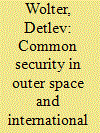

|
|
|
|
|
| Publication |
Geneva, United Nations, 2006.
|
| Description |
xx, 294p.
|
| Standard Number |
9290451777
|
|
|
|
|
|
|
|
|
|
|
|
Copies: C:1/I:0,R:0,Q:0
Circulation
| Accession# | Call# | Current Location | Status | Policy | Location |
| 051152 | 341.738/WOL 051152 | Main | On Shelf | General | |
|
|
|
|
| 7 |
ID:
034588
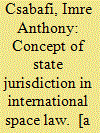

|
|
|
|
|
| Edition |
Csabafi
|
| Publication |
Hague, Martinus Nijhoff, 1971.
|
| Description |
xxvi, 197p.
|
| Standard Number |
9024750156
|
|
|
|
|
|
|
|
|
|
|
|
Copies: C:1/I:0,R:0,Q:0
Circulation
| Accession# | Call# | Current Location | Status | Policy | Location |
| 011224 | 341.46/CSA 011224 | Main | On Shelf | General | |
|
|
|
|
| 8 |
ID:
147518
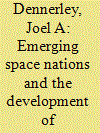

|
|
|
|
|
| Summary/Abstract |
The principle of international cooperation underpins space law and therefore space activities. In certain respects, international cooperation in regards to various spatial activities is and has been fostered effectively. However, in relation to the development of international regulations and standards applicable to outer space, the principle of international cooperation has not been applied as effectively or collaboratively as it might have been. The development of international regulatory regimes and industry standards can run the risk of being dominated by more powerful, industrialized countries that invest resources and time into ensuring that their technology, as well as their regulatory and standards agendas prevail. This phenomenon has the potential to affect the global space industry, where the future development of space law may exhibit a bias in favour of established space nations over emerging space nations. This is because established space nations tend to be, and have greater capacity to be, more active in international standard setting and in the formulation of space regulations. These States often compliment their high levels of economic investment in space with a corresponding political will to promote space endeavours, as well as shape appropriate laws and regulations around their respective space industries. Emerging space nations that are serious about developing their international space presence must adopt a similar strategy if they are to make any meaningful contribution to the future evolution of international space law. If this does not happen, we may witness an international space law regime that favours some States over others, by virtue of the fact that certain States are more active in standards setting. This in turn would diminish of the impact of the principle of international cooperation between States in relation to outer space activities. This article examines the principle of international cooperation in space, and how it relates to the development of international regulatory regime and standards. In particular, the article highlights the inequality than can manifest between established space nations and emerging space nations in regards to the how space regulations and standards are formulated and ultimately adopted.
|
|
|
|
|
|
|
|
|
|
|
|
|
|
|
|
| 9 |
ID:
061843
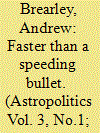

|
|
|
|
|
| Publication |
Spring 2005.
|
| Summary/Abstract |
Orbital debris, trapped in the Earth's gravity, presents a real and growing threat to human activity in space. This essay investigates the technical and legal environments within which the problem exists, questioning the available technical remedies and the applicability of space law to the current situation. This leads to an examination of whether the physical problem of debris reveals a need to reconsider the manner in which Earth orbit is conceptualised. The conclusion assesses the scope of the problem and the policy implications which it will have.
|
|
|
|
|
|
|
|
|
|
|
|
|
|
|
|
| 10 |
ID:
132719
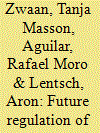

|
|
|
|
|
| Publication |
2014.
|
| Summary/Abstract |
The EU 7th Framework Project FAST20XX [1] aimed to enlarge the foundations of suborbital high-speed transportation in a wide variety of fields. One of the key issues of this project was to outline a desirable regulatory framework that would best serve the interests of all European stakeholders in this new activity.
The US Federal Aviation Administration (FAA) has issued a series of requirements for operators of commercial suborbital flights under the 2004 Commercial Space Launch Amendments Act (CSLAA), enabling the corresponding market to develop. These regulations were initially valid until 2012 but have now been extended until 2015.
In Europe, practical and successful attempts to fly experimental vehicles of this kind do not yet exist. However, several developments indicate that it is becoming urgent to pay attention to this potential new industry and find ways to regulate it in a safe yet flexible manner. Although the European Aviation Safety Agency (EASA) explored the possibility in 2008 to prepare for a certification approach under the concept of "Suborbital Aeroplanes" (SoA), this initiative was put on hold in 2011, and a final decision by the European Commission is still pending.
This paper highlights some of the research performed by the authors towards the establishment of a roadmap for future regulation of suborbital flight in Europe. In particular, it will present results of a survey carried out among stakeholders, including operators and manufacturers of vehicles, spaceports, national and European regulators, insurers and brokers, consultants, users and lobbyists. The paper also presents results from the workshop on the future regulatory framework for suborbital flights in Europe, which was co-organised by the present authors and held in Brussels in October 2012.
|
|
|
|
|
|
|
|
|
|
|
|
|
|
|
|
| 11 |
ID:
182612
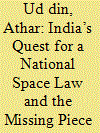

|
|
|
|
|
| Summary/Abstract |
As the commercial use of outer space becomes feasible, the nature of possessory rights will potentially emerge as the central focus of future space-related activities. The existing international law relating to outer space does not address in detail the nature of possessory rights in outer space and is subject to multiple interpretations. Alarmingly, the recently adopted space policies and legislations by some States have taken a definitive position regarding the commercial use of natural resources in outer space.
|
|
|
|
|
|
|
|
|
|
|
|
|
|
|
|
| 12 |
ID:
034587
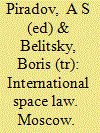

|
|
|
|
|
| Publication |
Moscow, Progress Publishers, 1976.
|
| Description |
271p.
|
|
|
|
|
|
|
|
|
|
|
|
Copies: C:1/I:0,R:0,Q:0
Circulation
| Accession# | Call# | Current Location | Status | Policy | Location |
| 032523 | 341.46/PIR 032523 | Main | On Shelf | General | |
|
|
|
|
| 13 |
ID:
157171
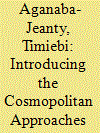

|
|
|
|
|
| Summary/Abstract |
Third World Approaches to International Law or TWAIL is a useful starting point to assess space governance issues from the perspective of emerging or aspirant space actors and users because it helps to highlight imbalances and asymmetry around the supposed “legal right” to space benefit under Article I(1) of the Outer Space Treaty. However, a new analytical lens focused on Cosmopolitan Approaches to International Law or CAIL is proposed that can deconstruct the existing agenda in light of it obscuring the idea of shared benefits without attributing blame, scepticism or negativity, a charge often placed against TWAIL perspectives. This paper asks what one learns from the space law context that prompts us to reorient the frame of analysis that TWAIL perspective brings to bear and focus on a CAILian perspective. Primarily that a TWAILian approach is too one sided and polarized and that a CAILian approach acknowledges reciprocal responsibilities. It highlights the implications of the approach both for emerging and aspirant as well as established space nations specifically and for global space governance in general.
|
|
|
|
|
|
|
|
|
|
|
|
|
|
|
|
| 14 |
ID:
039649
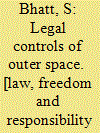

|
|
|
|
|
| Publication |
New Delhi, S Chand, 1973.
|
| Description |
x, 372p.
|
|
|
|
|
|
|
|
|
|
|
|
Copies: C:1/I:0,R:0,Q:0
Circulation
| Accession# | Call# | Current Location | Status | Policy | Location |
| 011949 | 341.47/BHA 011949 | Main | On Shelf | General | |
|
|
|
|
| 15 |
ID:
130043
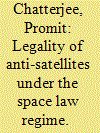

|
|
|
|
|
| Publication |
2014.
|
| Summary/Abstract |
The term anti-satellite, or in short ASAT, is used to refer to a system designed to destroy or damage satellites. The heightened tendency among the spacefaring nations to develop ASAT technology in the recent past has led to widespread debates as to the legality of ASAT deployment under the space law regime. In this context, I have endeavored to make a detailed analysis of the international legal provisions to find if there is any legal basis at all for the deployment of such ASATs. I have concluded that none of the existing legal provisions in space law, as well as public international law, have sufficient force and clarity to bring about a blanket ban on ASAT weapons. Therefore, the research suggests a slew of reforms to overcome this anomaly. Examples of such proposed reforms include, inter alia, an amendment of the Outer Space Treaty and an enhanced role and influence of the United Nations in treaty making coupled with active diplomatic initiatives.
|
|
|
|
|
|
|
|
|
|
|
|
|
|
|
|
| 16 |
ID:
072004
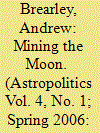

|
|
|
|
|
| Publication |
2006.
|
| Summary/Abstract |
The legal regime under which the resources of the Moon can be exploited is unclear. Recent proposals indicate that states are now planning to return to the Moon. Lunar resources offer great potential, both for terrestrial applications and in the exploration of space. The possibility of resource use, in the foreseeable future, creates the need for a clarification of the legal regime in relation to the Moon. This paper explores the present legal situation, identifies shortcomings in space law, and seeks precedents in the structures that are in place to govern other global Commons. The Third United Nations Convention on the Law of the Sea is assessed as the most relevant treaty, as it regulates the use of resources located outside of the state, and it can provide an analogy for a potential regime to govern the resource utilization of the Moon. The Law of the Sea reveals further problems concerning an international agreement, for the regime highlights the discontent between developed and developing states. This draws attention to the situation concerning the Moon's legal status, for although a regime to govern lunar activities is preferable, it would likely be formed in circumstances where technologically advanced states are aware of the lunar resources which they can potentially monopolize.
|
|
|
|
|
|
|
|
|
|
|
|
|
|
|
|
| 17 |
ID:
028583
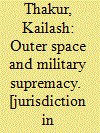

|
|
|
|
|
| Publication |
New Delhi, Deep and Deep Publications, 1985.
|
| Description |
180p.
|
|
|
|
|
|
|
|
|
|
|
|
Copies: C:1/I:0,R:0,Q:0
Circulation
| Accession# | Call# | Current Location | Status | Policy | Location |
| 025604 | 358.8/THA 025604 | Main | On Shelf | General | |
|
|
|
|
| 18 |
ID:
147516


|
|
|
|
|
| Summary/Abstract |
space governance issues from the perspective of emerging or aspirant space actors and users because it helps to highlight imbalances and asymmetry around the “legal right” to space benefit under Article I(1) of the Outer Space Treaty. However, a new analytical lens focused on Cosmopolitan Approaches to International Law or CAIL is proposed that can deconstruct the existing agenda in light of it obscuring the idea of shared benefits without attributing blame, scepticism or negativity. In the quest to ensure fairness to all, including aspirant emerging space actors, largely from developing States, this paper asks what does one learn from the space law context that prompts us to reorient the frame of analysis that Third World Approaches to International Law (TWAIL) perspective brings to bear and focus on a CAILian perspective? Primarily that a TWAILian approach is too one sided and polarized. A CAILian approach however acknowledges reciprocal responsibilities. In conclusion, I am not making a claim here that my CAILian concept has never been articulated before. However, the way I link the concept of Cosmopolitanism with a school of thought that I am sympathetic to (TWAIL) is where this paper provides a novel idea. My specific version of Cosmopolitanism bears in mind the importance of collective ideas. While CAIL will not be free from power asymmetry's because there will always be polarity; it still chooses to focus on the middle ground and not to focus on extremes.
|
|
|
|
|
|
|
|
|
|
|
|
|
|
|
|
| 19 |
ID:
049014
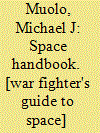

|
|
|
|
|
| Publication |
Alabama, Air University Press, 1993.
|
| Description |
xix, 162p.
|
| Contents |
Vol. 1
|
|
|
|
|
|
|
|
|
|
|
|
Copies: C:1/I:0,R:0,Q:0
Circulation
| Accession# | Call# | Current Location | Status | Policy | Location |
| 039736 | 358.803/MUO 039736 | Main | On Shelf | General | |
|
|
|
|
| 20 |
ID:
169340
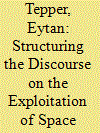

|
|
|
|
|
| Summary/Abstract |
A critical discussion is reemerging in space policy, economics, and law: on the classification, use and possible ownership of space resources, and the governance of these activities in terms of rules and institutions. The US legislation from 2015, recognizing the right of US citizens to all asteroid resources they obtain, clearly signals that “money time” has come, in every meaning. Planetary Resources, Inc. has declared this new legislation “the single greatest recognition of property rights in history”. Yet, the discourse on space resources, which are widely—but not necessarily duly—regarded as “commons”, is unstructured and crippled by the confusion of the notion and essence of “commons” between the economic and the legal meanings. This article provides a critical analysis of the “commons” feature of outer space and outer space resources, based on economic analysis and legal theory. More importantly, this article seeks to provide the structure for this important discourse. The first critical step is to distinguish between (i) commons as an economic term and (ii) commons as a legal regime. The first refers to a type of goods or resource used by multiple users, and the second refers to a property rights regime, the ownership over the resource. A mistake, often made, is the confusion between the economic notion of “commons” and the legal sense of the same concept. An “economic commons”, such as a lake, may have different property rights regimes as it may be private property, government property, or “legal commons”. The second critical differentiation is between the different parts of space (e.g. orbits, celestial bodies, and void space) because some may be “commons” (economic and/or legal) while others may not. Asking whether “space” is commons wrongly puts numerous things in a single basket is a sweeping generalization and, in the economic sense, utterly meaningless. Another important distinction is between resource systems and resource units. If we get the questions wrong, i.e. by confusing the terms and mixing different subjects of inquiry, we will not, by definition, find the right answers. Furthermore, the article demonstrates that the notion of “global commons”, often applied to outer space, is of limited or unclear meaning, and it does not imply the property rights regimes in the domains and resources it presumably describes, including outer space. The article opens with making the aforementioned three distinctions in section two. Sections three and five present, separately, the economic and legal notions of “commons” and examine whether some parts of space qualify as economic and/or legal commons, whereas section four presents the limitations of the notion of “global commons”, thus leading to section five. The article concludes by connecting the economic and legal discussions to the search for appropriate governance models for each part of space. As the article demonstrates, the real questions in the discourse are much more complex than “is space commons?”. Although this article provides preliminary answers to the questions it raises, its main contribution is the reshaping of the question(s) currently being asked and the structuring of the discourse on space resources and their governance.
|
|
|
|
|
|
|
|
|
|
|
|
|
|
|
|
|
|
|
|
|